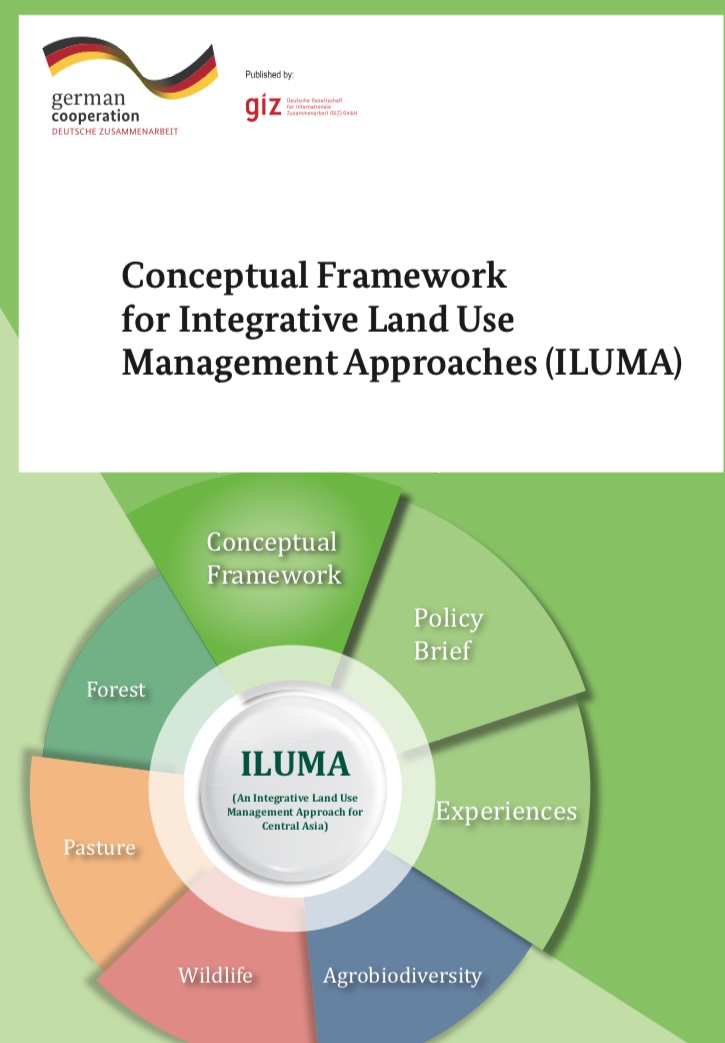What is the Integrative Land Use Management Approaches about?
The Integrative Land Use Management Approaches (hereinafter in the text – ILUMA) consist of a collection of land use practices that were piloted and tested in Central Asia for more than 10 years and a theoretical background that describes the underlying approach: Coming from practice, going to the concept. The dimensions mentioned in the Conceptual Framework are the theoretical background for ILUMA. The Conceptual Framework describes all dimensions related to land use management. They are organised in such a way that they can be used for different purposes: for stakeholders developing a common approach on land management, developing sector policies or programme planning and monitoring. The Conceptual Framework is particularly targeted at readers tasked with overall planning and strategy development of initiatives aimed at sustainable land use management that might require a more profound understanding of the concepts applied and developed by the Deutsche Gesellschaft für Internationale Zusammenarbeit (GIZ) GmbH (German federal enterprise for international cooperation) in Central Asia.
How was the Integrative Land Use Management Approaches developed?
The Regional Program for Sustainable and Climate Sensitive Land Use for Economic Development in Central Asia (hereinafter in the text – SLU-CA) and its predecessor programmes implemented by GIZ focused on addressing land degradation in the five countries of Central Asia – Kazakhstan, Kyrgyzstan, Tajikistan, Turkmenistan and Uzbekistan – since the early 2000s. The activities are aimed at halting further degradation of natural resources and promoting sustainable management of forests, pastures and wildlife. At a later stage measures on climate change adaptation were included recognising the important role of land use. SLU-CA applied a multi-level and learning cycle approach (see next paragraph), which follow the intervention logic of 1) developing and piloting land use practices locally, 2) based on the experience on the field, sector reforms were derived and upscaled, and 3) sharing of the knowledge about these land use practices and sector reforms in the countries of the region.
At the beginning of its implementation, the Regional Programme started to frame the process to develop policies as a learning cycle and to use this understanding to derive a suitable intervention logic. This idea of the learning cycle has become the underlying theory of change of the Programme. The learning cycle of technical cooperation, in which the starting point is the generation of best practices in close cooperation with local beneficiaries, before negotiating regulations at the top, reverses the logic applied in financial cooperation, in which the top level of the government’s administration is involved from the start in shaping the interventions. Technical cooperation, therefore, has an opportunity to get a foot in the door and to start developing small-scale changes, which could then be used as examples of best practices, for scaling up or scaling out.
Besides the learning cycle, applying a landscape approach was another guiding factor that led to the development of ILUMA. Originally, the Regional Programme piloted numerous land use approaches in Central Asia, together and alongside other organisations and institutions. In the past, different land use types were tackled in isolation from each other, such as forestry or pasture management. However, it became obvious that it was necessary to broaden the perspective and to look at the wider landscape. Therefore, GIZ started to apply a landscape approach that tries to balance “competing for land use demands in a way that is the best for human well-being and the environment. It means creating solutions that consider food and livelihoods, finance, rights, restoration and progress towards climate and development goals.
Why Integrative Land Use Management Approaches?
The implementation of land-based mitigation and adaptation options is not only a technological challenge. Targeting only the proximate causes of mismanagement of land (e.g. better irrigation systems) will not be enough to achieve sustainable land use. Socio-economic, institutional, financial and environmental issues that differ across regions must be considered. Therefore, Integrative Land Use Management Approaches are based on the understanding of landscapes as ecosystems comprising environmental, human, cultural, technological and institutional dimensions, amongst others. Potentially harmful effects of land use changes that are reflected
primarily in changes of land cover are the result of complex interactions between these different dimensions. Hence, addressing only one dimension will not lead to sustained landscape management. Consequently, ILUMA addresses not just the key challenges of land management, which are related to desertification, land degradation or climate change adaptation, but also challenges related to people’s behaviour, their culture, interests and conflicts, the management of the environment, sector policies, organisational development, as well as technical solutions to prevalent problems.
Most practitioners, land resource and project managers or policymakers have already worked on different ILUMA dimensions. Nevertheless, land management approaches have not been organised in this way, i.e. by using a comprehensive conceptual framework. Instead, land management approaches mainly focus on the resources they address themselves without explicitly considering factors outside the immediate vicinity of the respective natural resource. For that reason, we explore and present in the ILUMA compendium the experiences gained regarding sustainable land use management in the context of the Regional Programme and provide a conceptual framework as theoretical background for a more holistic approach
Documents for downloading:
Kazakhstan: Integrative Forest Management in Kazakhstan for Integrative Land Use Management Approaches
Kyrgyzstan: Integrative Land Use Management Approaches in Kyrgyzstan
Tajikistan: Integrative Land Use Management Approaches in Tajikistan
Turkmenistan: Integrative Forest Management in Turkmenistan for Integrative Land Use Management Approaches, Pasture Management in Turkmenistan for Integrative Land Use Management Approaches
Uzbekistan: Integrative Forest Management in Uzbekistan for Integrative Land Use Management Approaches
